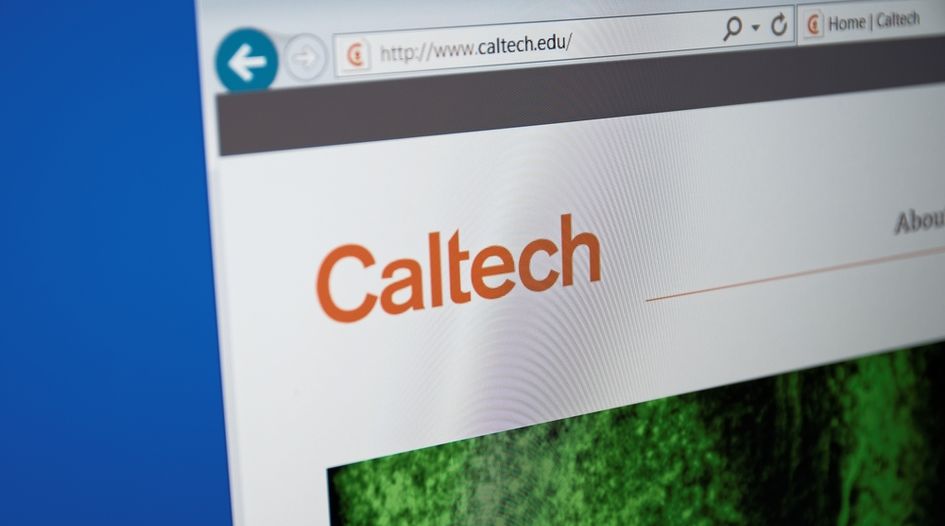Tech
Caltech’s Wi-Fi battle against Big Tech ends with Dell settlement

The California Institute of Technology and Dell Technologies Inc informed the US District Court for the Western District of Texas earlier this month that they will settle and voluntarily retract a lawsuit accusing Dell of infringing the university’s patents related to Wi-Fi technology.
At IAM, we used Docket Navigator to review Caltech’s district court litigation, particularly its suits against five big tech companies – Apple Inc, Broadcom Corp, Dell, HP Inc, Microsoft Corp and Samsung Electronics Co – which all asserted patents that covered Wi-Fi-enabled products using improved Institute of Electrical and Electronics Engineers standards.
Caltech sued Dell in 2020, alleging that Wi-Fi technology in the company’s laptops, desktops and other products infringed five of the university’s US patents: 7,116,710; 7,421,032; 7,916,781; 8,284,833; and 7,716,552.
The parties informed the court that the case would be dismissed with prejudice.
Attorneys for Caltech and Dell did not respond to requests for comment.
US district court
Caltech has filed 18 cases in district court as shown in Table 1. Six of the cases had co-plaintiffs.
Table 1: Caltech’s district court litigation record
|
Defendants |
Year filed |
Year terminated |
Outcome |
|
Bio Rad Laboratories Inc |
2023 |
Active |
|
|
Bio Rad Laboratories Inc |
2023 |
2023 |
Transferred |
|
Samsung and subsidiaries |
2021 |
2023 |
Settled/voluntarily dismissed |
|
Microsoft |
2021 |
2024 |
Settled/voluntarily dismissed |
|
HP |
2020 |
2024 |
Settled/voluntarily dismissed |
|
Dell and subsidiaries |
2020 |
2024 |
Settled/voluntarily dismissed |
|
Apple |
2016 |
2023 |
Settled/voluntarily dismissed |
|
DISH Network and subsidiaries |
2015 |
2016 |
Settled/voluntarily dismissed |
|
DISH Network and subsidiaries |
2013 |
2016 |
Settled/voluntarily dismissed |
|
OmniVision Technologies Inc |
2013 |
2014 |
Scope of Docket Navigator’s outcome data for district court is limited to cases terminated after 1 January 2016 |
|
Promega Corp |
2012 |
2012 |
|
|
LG Electronics Inc and subsidiaries |
2010 |
2012 |
|
|
Cefla Dental Group America Inc and subsidiaries |
2010 |
2012 |
|
|
Instrumentarium Dental Inc |
2009 |
2009 |
|
|
Canon Inc and subsidiaries |
2008 |
2010 |
|
|
Canon Inc and subsidiaries |
2008 |
2009 |
|
|
Boulder Sci Co |
2002 |
2004 |
|
|
Allen Osborne Association |
2000 |
2001 |
The dismissal of the Dell lawsuit means Caltech has terminated 17 cases and only has one that is active – against Big Rad Laboratories Inc, a manufacturer of specialised technology for life science research and clinical diagnostics markets.
The scope of Docket Navigator’s outcome data for district court is limited to cases terminated after 1 January 2016. While one case was transferred, all other terminated cases after that date were settled and voluntarily dismissed.
Source: Docket Navigator
Batting tech companies over Wi-Fi chips
Caltech’s suits against Apple and Broadcom, Dell, HP, Microsoft, and Samsung all involved patents related to “error correction codes”, and improvements to several IEEE Wi-Fi standards included high throughput modes implementing these codes to “allow for faster data transmission”, according to the university’s complaints.
All suits asserted four patents described as “serial concatenation of interleaved convolutional codes forming turbo-like codes”, while its suits against Dell, HP, Microsoft and Samsung included a fifth patent (7,716,552).
All suits target wireless-enabled products that comply with IEEE’s 802.11n, 802.11ac or 802.11ax Wi-Fi standards.
Caltech v Apple
The university’s most prominent case was against Apple and Broadcom. Caltech’s complaint said that Broadcom chips using the infringed technology were found in millions of Apple devices, including Apple Watches, iPhones, and iPads. Apple countersued Caltech to challenge the validity of the patents but was unsuccessful as they used prior art they already knew about back when they filed the inter partes reviews.
Judge George Wu of the US District Court for the Central District of California barred Apple and Broadcom from raising invalidity arguments to the jury based on the statutory estoppel doctrine. The decision strengthened rules to prevent duplication of invalidity arguments in IPRs and district court litigation.
The jury ordered Apple to pay $837.8 million and Broadcom to pay $270.2 million – or $1.1 billion in total. However, the damages award was overturned by the US Court of Appeals for the Federal Circuit in 2022. The original award was described as “legally unsupportable” and a new damages trial was ordered.
Crucially, the appeals court ruled that the trial judge was correct in his statutory estoppel finding, confirming the validity of the Caltech patents.
A trial to redetermine the amounts was indefinitely postponed in May 2023 and the US Supreme Court denied Apple’s petition for writ of certiorari that sought to limit the Federal Circuit’s ruling on IPR estoppel.
Ultimately, all parties decided to settle the matter in 2023.
Caltech resolving its suit against Dell means an end to the university’s battle against tech companies for now.










